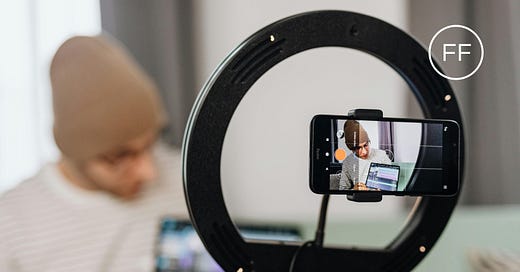The Influencerization of Music Journalism
a.k.a. What happens when audiences care more about personalities than publications?
Earlier this month, Pitchfork named Mano Sundaresan, best known as the founder of the (mostly) hip-hop blog No Bells, as the site’s new head of editorial content. It was a surprise choice. Sundaresan only graduated from college in 2019 and started No Bells in 2021, and though the site quickly gained a passionate following online, it’s exceedingly rare for someone so young to be put in charge of a flagship music publication. Adding to the intrigue is that fact that No Bells has always been a niche operation; though it’s garnered co-signs from tastemaker outlets like NTS (where Sundaresan hosts monthly radio show) and Nina (where he and fellow editor Millan Verma author a monthly column), and is legitimately beloved by a youthful cohort of what might be described as independent music’s chattering class, the blog itself has a relatively modest following. As of right now, No Bells has less than 4200 followers on Instagram and just over 8700 followers on TikTok, numbers that are unlikely to get the folks in Condé Nast’s marketing department salivating.
That reality was acknowledged in the lengthy interview that announced Sundaresan’s hiring. Published in Billboard, the conversation included his admission that “[No Bells] didn’t always have the highest readership. That wasn’t our goal.” The piece also featured extensive input from Sundaresan’s new his boss, Will Welch, the global editorial director of both GQ and Pitchfork, who specifically said, “this is not a time of traffic as the be-all, end-all. Without taking it to a naive extreme, Mano’s directive is not to chase traffic.”
To music journalists, especially those who’ve effectively spent the past 15 years under orders to chase virality and deliver clicks by any means necessary, these statements might sound refreshing. For the more cynical, however, they might also sound familiar, as countless publications have brought in new editorial regimes during the digital media era, and they almost always promise to focus on quality over quantity—at first. But after a few quarters of lackluster traffic, those same publications usually wind up reversing course, pivoting to cheap, click-friendly content before they eventually clean house and start the whole cycle over again. (It’s also not reassuring that when Sundaresan and Welch were specifically asked about the mass layoffs that hit Pitchfork earlier this year, the latter completely dodged the question.)
Time will tell how this all plays out at Pitchfork, and while both Sundaresan and Welch cited Pitchfork’s reviews as something that will continue to be foundational content, it’s also safe to assume that some changes are coming down the pike. Sundaresan didn’t get into specifics, but it’s not hard to extrapolate what direction he has in mind after he said, “I think we’re in this age where we turn to individual tastemakers for validation when we’re curious about new music. I think more care needs to be put into building worlds around those tastemakers.” He continued, “We can tap into the incredible writers that are on staff and try to build verticals and columns around what they’re doing—cater to more specialized audiences that way and younger audiences that way.”
In other words, he sees the future Pitchfork as a collection of well-respected individual voices, as opposed to the publication itself (or its legacy) being the main attraction. He may not have used the word “influencer,” but is there a better way to characterize building verticals, columns and worlds in which the authority, expertise and charisma of single writers and / or personalities is a major selling point of the content? At the very least, it’s the embrace of a different kind of music journalism, one in which objectivity—or, more accurately, the pantomime of objectivity—is deprioritized (or discarded altogether) and journalists themselves are often part of the story.
That sort of storytelling was often at the heart of what No Bells put out into the world, and Sundaresan says he wants to bring the same sort of “community-driven” and “on the ground” perspective to Pitchfork. What exactly will that look like? It’s impossible to know for sure, but there are plenty of clues out there, particularly on social media, but also at other publications, some of which are already (albeit more quietly) making similar pivots of their own.



